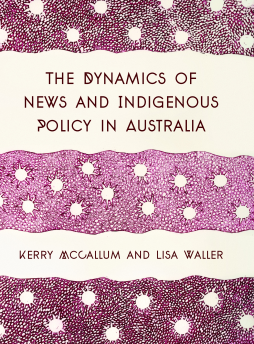
Additional Information
Book Details
Abstract
Despite intense concern among academics and advocates, there is a deeply felt absence of scholarship on the way media reporting exacerbates rather than helps to resolve policy problems. This book offers rich insights into the news media’s role in the development of policy in Australia, and explores the complex, dynamic and interactive relationship between news media and Australian Indigenous affairs. Spanning a twenty-year period from 1988 to 2008, Kerry McCallum and Lisa Waller critically examine how Indigenous health, bilingual education and controversial legislation were portrayed through public media. The Dynamics of News and Indigenous Policy in Australia provides evidence of Indigenous people being excluded from policy and media discussion, as well as using the media to their advantage. To that end, the book poses the question: just how far was the media manipulating the national conversation? And how far was it, in turn, being manipulated by those in power? A decade after the Australian government introduced the controversial 2007 Northern Territory Emergency Response Act, McCallum and Waller offer a ground-breaking look at the media’s role in Indigenous issues and asks: to what extent did journalism exacerbate policy issues, and how far were their effects felt in Indigenous communities?
"This book provides one of the most thorough, contextually rich, and clearly explained accounts of the rapid slide backwards in Indigenous affairs, from self-determination and reconciliation to intervention, over the last two decades."
Dr. Christina Spurgeon
Table of Contents
| Section Title | Page | Action | Price |
|---|---|---|---|
| Cover | Cover | ||
| Half Title | i | ||
| Title | iii | ||
| Copyright | iv | ||
| Contents | v | ||
| Preface | vii | ||
| Acknowledgements | ix | ||
| Part I: Setting the Scene | 1 | ||
| Chapter 1: Introduction: Media dynamics and policy intractability | 3 | ||
| Chapter 2: Policy histories and discursive environments | 21 | ||
| Part II: Media Coverage of Indigenous Affairs | 35 | ||
| Chapter 3: Race, indigeneity and the media: Theoretical trajectories in Australian studies of Indigenous media representation | 37 | ||
| Chapter 4: News from another country: Remote Indigenous reporting for mainstream audiences | 57 | ||
| Chapter 5: The Australian and Indigenous affairs | 81 | ||
| Part III: Indigenous Health Policy | 103 | ||
| Chapter 6: Key moments in Indigenous health policy, 1988–2008 | 105 | ||
| Chapter 7: Framing Indigenous health in the Australian news media | 119 | ||
| Chapter 8: Policymakers’ media-related practices and ‘new paternalism’ in Indigenous health | 165 | ||
| Part IV: Bilingual Education | 193 | ||
| Chapter 9: Bilingual education: A case study | 195 | ||
| Chapter 10: Saving bilingual education: Media-related practices of Indigenous policy advocates | 203 | ||
| Chapter 11: A game of mirrors: News, policy and bilingual education | 227 | ||
| Chapter 12: Conclusion: Change and continuity in media and Indigenous affairs | 259 | ||
| References | 277 | ||
| Index | 309 | ||
| Back Cover | Back Cover |
